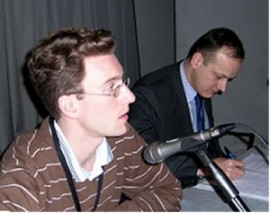
I had the honour and pleasure to represent Federal Union at the European Citizens’ Convention in Genoa last weekend. It was a fascinating occasion, leading to some useful debate. (You can find the final statements from the Convention by clicking here.)
Nevertheless, it was invigorating to discuss the issues at stake with people from outside the immediate federalist tradition. I was chairing the workshop on economic and environmental issues (it is quite hard work chairing a discussion in two languages through headphones) which brought together three different strands of thought. There was the liberal capitalist viewpoint (which you also find in the early British federalists – the article by W B Curry on this website explains this), the social left viewpoint – we had speakers from trade unions who were insistent on this – and the green/ecological viewpoint, which was pointing to what liberal capitalists might call uncosted externalities, if they called them anything at all.
What united all the different strands approaches was the concern that national borders were getting in the way and obstructing successful policies. The gaps between national jurisdictions allowed all kinds of market distortions, social exploitation and unsustainable resource depletion, according to whichever strand you are part of. A democratic and effective response was needed, meaning a European constitution, according to all the strands. And who am I to disagree?
Genoa is on the Mediterranean coast of Italy, protected from the rest of the country by a curtain of mountains. The rain in the mountains fell as snow, heavy snow. Many participants at the Convention arrived late, having been stranded in their cars and buses waiting for the snow to be cleared. It showed, in a simple way, the limits that the natural environment places on our economic activities. Coming to terms with those limits is a central challenge for modern politics. Creating a united Europe doesn’t guarantee that we will solve them, but failing to unite Europe will guarantee that we fail.
